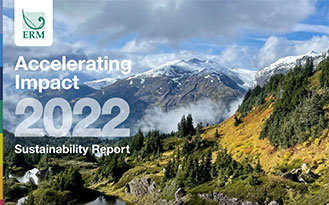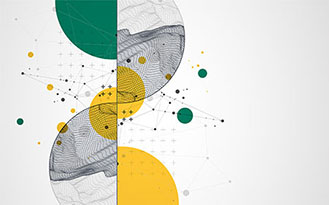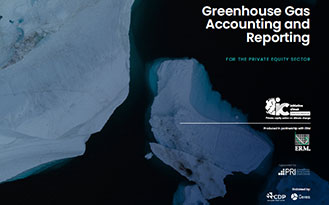
A new survey from the SustainAbility Institute by ERM and GlobeScan finds that sustainability leadership is increasingly being measured by evidence of action, impact, and above all the integration of sustainability into business strategy.
The GlobeScan / SustainAbility Leaders survey, which questioned more than 700 sustainability professionals across 73 countries in March and April 2022, reveals a significant evolution in the way companies are assessed on their sustainability leadership.
High-profile CEO engagement and strong communication around sustainability have declined as indicators of recognized leadership. Purpose and goals remain important, but companies are increasingly considered as leaders for putting sustainability at the core of their business models and strategies, and for reporting on the tangible outcomes of their sustainability initiatives.
Urgency of sustainable development challenges and sector performance
Sustainability experts are now almost unanimous in declaring the urgency of climate change, while energy security is growing in perceived urgency in the context of the war in Ukraine. Meanwhile, other key sustainable development challenges, particularly social issues such as poverty, access to healthcare and opportunities for education have decreased in perceived urgency compared to last year.
The majority of sectors are seen by experts to be performing worse on the transition to sustainability than they were a decade ago, with especially poor ratings for managing the transition to sustainable development given to the extractive sectors. However, the banking/finance, electric utilities, and automotive sectors are believed to have improved their sustainability transition performance in recent years.
In the short-term, the experts surveyed believe that the war in Ukraine means attention focused away from the sustainability agenda. However, when asked about the long-term, an accelerated shift to renewable energy is the most widely-cited expected impact of the conflict on the sustainability agenda.
Mark Lee, Director of the SustainAbility Institute by ERM said: “While experts anticipate that the war in Ukraine will reduce focus on the sustainability agenda in the near-term, survey respondents globally continue to underscore the urgency of action on climate change, biodiversity, inequality, and a host of other sustainability issues, calling on companies to provide more evidence of how they are embedding sustainability in their business models.”
Chris Coulter, CEO of GlobeScan said: "There is a sharpening of the urgency around climate and nature for stakeholders and a shifting expectation for leading companies to be focused on delivering impact, not only on their own performance but also for the broader sustainability agenda.”
Institutional performance on sustainable development
The survey also found that national governments, the private sector, and multi-sectoral partnerships are expected to lead the sustainable development agenda, with expectations of governments in particular increasing in recent years. However, experts have become less prone to expect sustainable development leadership from the United Nations and NGOs.
Unilever continues to top the list of companies recognized as sustainability leaders (named by 31% of respondents for the way it integrates sustainability into its business strategy), with Patagonia in second place at 22%. Microsoft makes the top five for the first time, behind Natura &Co and IKEA.
While the list of globally recognized sustainability leaders has changed only modestly in recent years, different names emerge when experts are asked to identify sustainability leaders among companies headquartered in their own regions. Experts in Africa and the Middle East highlight Nedbank, Safaricom, and Woolworths as sustainability leaders, while those in Asia-Pacific point to Tata. In Latin America and the Caribbean Natura &Co is the stand-out recognized sustainability leader, named by 55% of experts in that region.
Among NGOs, sustainability experts overwhelmingly recognize the World Wildlife Fund as the leader in sustainable development (named by 35% of respondents), followed by Greenpeace (named by 13%) and the World Resources Institute (named by 10%).
Notes to editors
The GlobeScan / SustainAbility Survey of Experts stakeholder research program captures insights from sustainability experts and charts the shifting sustainability agenda over time.
As the largest and longest-running survey of its kind it has tracked expert opinions on sustainable development leadership for more than 25 years. The research draws from bi-annual surveys of our global panel of experienced sustainability experts (including leaders in business, government, NGOs, and academia) on topics such as recognized leadership, climate change, biodiversity, inequality, the SDGs, and key emerging issues.
A total of 718 qualified sustainability experts across 73 countries and representing different sectors including Corporate, Service & Media, Academia, NGOs and Government, completed the online questionnaire between 14 March and 1 May, 2022.
About the SustainAbility Institute by ERM
The SustainAbility Institute is ERM’s primary platform for thought leadership on sustainability. Its purpose is to define, accelerate, and scale sustainability performance by developing actionable insight for business. The Institute identifies innovative solutions to global sustainability challenges built on ERM’s experience, expertise, and commitment to transformational change.
As the largest global pure play sustainability consultancy, ERM partners with the world’s leading organizations to create innovative solutions to sustainability challenges and unlock commercial opportunities that meet the needs of today while preserving opportunity for future generations.
ERM’s diverse team of 7,500+ world-class experts in over 150 offices in more than 40 countries supports clients across the breadth of their organizations to operationalize sustainability. Through ERM’s deep technical expertise, clients are well positioned to address their environmental, health, safety, risk, and social issues. ERM calls this capability its “boots to boardroom” approach – a comprehensive service model that allows ERM to develop strategic and technical solutions that advance objectives on the ground or at the executive level.
 View all
View all 


